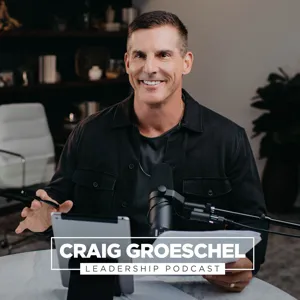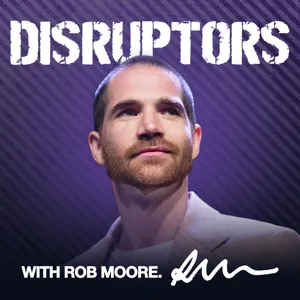Podcast Summary
Effective leadership through caring for team members: Building trust starts with being authentic and taking care of oneself first, allowing for emotional connection, autonomy, and individual progress to create strong, unstoppable teams.
Effective leadership lies in caring for the team members. Alden Mills, a former Navy SEAL platoon commander and founder of Perfect Fitness, emphasizes this point in his book "Unstoppable Teams." He calls it the care loop, which involves connecting with team members emotionally, giving them autonomy, and helping them progress as individuals. Mills' background includes experience leading teams in sports, military, civilian business, and nonprofit organizations. He believes that building trust, which is crucial for relationships, starts with being authentic and taking care of oneself first. By focusing on self-improvement, a leader can then lead effectively and build strong, unstoppable teams.
Embrace your authentic self for effective teams: Seek feedback from trusted sources to identify unique strengths and let go of need to be a tough persona
Understanding and embracing your authentic self is the foundation for building strong, effective teams. This means letting go of the need to be a tough, macho persona and instead allowing yourself to be as tough as the situation requires. It also means discovering your unique strengths and gifts, which is essential for unlocking the full potential of your team. To help identify your strengths, consider using a triangulation process, where you seek feedback from three trusted individuals in different areas of your life. By asking them what your one saving grace would be, you can gain valuable insights into your strengths and how to leverage them effectively. Remember, we're all unique and imperfect, and it's our differences and strengths that make us valuable members of a team.
Focus, Feel, Act: Overcoming Challenges with SEAL Team Training: Effective leadership involves recognizing strengths and weaknesses, using the Focus Feel Act formula to determine what's within control, and pushing beyond comfort zones to achieve more than imagined.
Effective leadership involves recognizing and focusing on one's strengths while being aware of and addressing one's weaknesses. This requires humility and the ability to adapt. The Focus Feel Act formula, inspired by the experiences of a SEAL instructor, emphasizes the importance of focusing one's mind, feeling the motivation behind actions, and taking action to achieve goals. This formula helps individuals determine what they can control and what they cannot, and to push beyond their comfort zones to achieve more than they think possible. The stories shared from SEAL training and the author's own experiences illustrate the importance of this formula in overcoming challenges and becoming an unstoppable team player.
Choosing a positive perspective: Focusing on the desired outcome can help individuals find motivation and resilience when faced with challenges, instead of dwelling on the negative consequences of quitting.
Our mindset and perspective play a significant role in overcoming challenges. The story shared involves a person who used a crutch, an asthma medication, to help them get through the initial stages of a rigorous training program. However, when confronted with the truth, they were faced with the choice to continue without it or quit. Instead of focusing on the negative outcome of quitting, they chose to focus on the positive outcome of completing the training and the impact it would have on their future. By shifting their perspective and focusing on the desired outcome, they were able to pass the challenge and ultimately stop relying on the crutch. This approach, known as an outcome account, can help individuals find motivation and resilience when faced with difficult situations.
Connecting with your team is the first step in effective leadership: Effective communication, including body language and tone, is crucial for building trust and connecting with team members. Prioritize connection in your leadership style to win their support.
Effective leadership starts with self-control and then focusing on connecting with your team. According to the care loop, which includes the actions of connect, achieve, respect, and power, the first step is to connect. This means showing that you care about your team members and building trust through communication, commitment, and credibility. Communication is a crucial component of connection, but it goes beyond just the words spoken. Body language and tone also play significant roles. Teddy Roosevelt and Abraham Lincoln both emphasized the importance of caring for others to win them over to your cause. Building trust through effective communication is essential for a successful team, and it takes time and effort. Remember, no one wants to follow someone who doesn't care about them, so make sure to prioritize connection in your leadership style.
Effective communication is more than just words: Communication, commitment, and credibility are crucial for building strong relationships and successful teams. Effective communication sets the foundation, while commitment and credibility help achieve goals and foster a culture of care, respect, and empowerment.
Effective communication is more than just words. It involves body language (55%), tone (38%), and words (7%). However, even great communication is not enough on its own. Commitment and credibility (94%) are essential to building strong relationships and successful teams. Communication sets the foundation, but commitment and credibility help achieve goals and foster a culture of care, respect, and empowerment. Remember, we're wired to reciprocate with care, and the reciprocity of care goes through the actions of connect, achieve, respect, and empower. Achieving is a crucial part of the care aspect as it sets the direction and goal for the team.
Five key elements for building a high-performing team in healthcare: Assume trust, assess progress, inspire with vision, appreciate challenges, assure support to build a strong, caring team
Building a high-performing team in a next-generation healthcare company involves five key elements, which the speaker refers to as the "5 A's." These elements are Assuming, Assessing, Aspiring, Appreciating, and Assuring. Assuming means trusting team members to do their jobs after hiring. Assessing involves checking in regularly on progress and addressing issues. Aspiring is inspiring team members with a clear vision for the future. Appreciating means showing understanding and support for team members' personal and professional challenges. Assuring means providing encouragement and support during times of failure. By implementing these five elements, a team can build trust, foster growth, and create a culture of care and service.
Leading with Respect: Leaders who respect their team members create an atmosphere where contributors are motivated to contribute their best.
Effective leadership goes beyond just connecting and achieving with team members. The third element of the care loop, respect, is crucial in transforming a group into a cohesive team. Respect is not about demanding obedience based on authority, but rather fostering a mutually respectful environment where everyone feels valued and their ideas are heard. Leaders who respect their team members and show it through their actions, rather than just their title, create an atmosphere where contributors are motivated to contribute their best. As Kennedy's interaction with the janitor at NASA illustrates, everyone wants to feel like their work matters and that they're a part of something bigger. By leading with respect, leaders can create high-performing teams where everyone feels engaged and motivated.
Creating emotionally connected teams leads to greater benefits: Leaders should create a culture of respect, encourage self-reporting of mistakes, and use questions to turn failures into learning opportunities
Creating an emotionally connected team or group, whether it's in the military, a community action group, or at work, leads to greater benefits and productivity than having a team made up of only mentally connected individuals. Volunteers are driven by their emotions to be a part of something important to them. As a leader, it's essential to create a culture of respect where mistakes are seen as opportunities for learning rather than moments of shame. Boston Children's Hospital is an excellent example of this, where mistakes are encouraged to be self-reported, and the focus is on learning and trying again. The leader should also lead by example and be the first to admit their mistakes. The three questions - what happened, what were you trying to achieve, and what will you do about it - help to diffuse negative emotions and turn mistakes into learning experiences. Failure is inevitable, but how we respond to it is what truly matters.
Connect, care, and empower team members: Effective leadership involves acknowledging mistakes, learning, sharing, empowering, building trust, fostering relationships, and encouraging team members to succeed
Effective leadership involves a continuous cycle of connecting, caring, and empowering team members. This process includes acknowledging mistakes, learning from them, and sharing those lessons with the team to prevent repeating errors. Empowerment means giving team members the authority and responsibility to take ownership of their work and succeed. This cycle fosters trust, builds relationships, and encourages team members to dare greatly. Remember, this isn't a linear process but a circular one, and it requires authenticity and adaptability from leaders. For more information on this approach, check out Alden Mills' website, Alden-Mills.com, or find his book "Unstoppable Teams" at your local bookstore or on Amazon.com.
Building Unstoppable Teams: Adapt, Communicate, and Thrive under Pressure: Build unstoppable teams by creating a shared vision, trust, psychological safety, and fostering individual and team resilience.
The importance of building unstoppable teams, as discussed with Alden Mills, the author of "Unstoppable Teams." Unstoppable teams are those that can adapt, communicate effectively, and thrive under pressure. Mills emphasized the importance of creating a shared vision, building trust, and fostering a culture of psychological safety. He also discussed the importance of individual and team resilience. To learn more about this topic, check out the show notes at aom.is/unstoppableteams, where you'll find resources for delving deeper into the topic. Remember, the principles of unstoppable teams can be applied in various aspects of life, from work to personal relationships. So, take action and start building your own unstoppable team today. Additionally, don't forget to visit Alden-Mills.com to learn more about his work, and consider purchasing his book, "Unstoppable Teams," available on Amazon.com and in bookstores everywhere. And, if you'd like to enjoy ad-free episodes of The Art of Manliness, sign up for a free month of Stitcher Premium using the promo code "manliness" at www.stitcherpremium.com. Lastly, don't forget to leave a review on iTunes or Stitcher to help spread the word about the podcast. And, as always, thank you for your continued support. Until next time, this is Brett McKay, reminding you to not only listen to the AOMPodcast, but put what you've heard into action.













